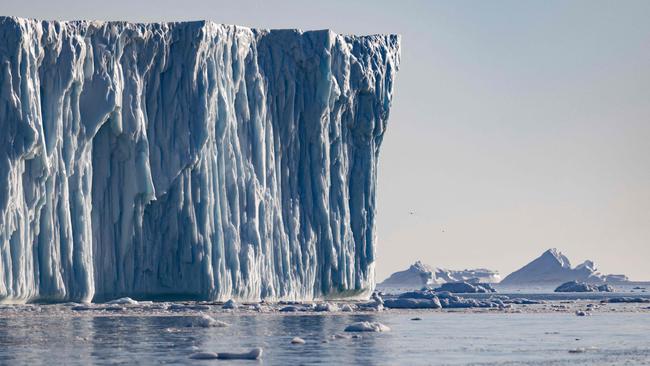Last eight years were the warmest in modern times, UN body says
The last eight years have each been warmer than all years before that period on record, according to a report by the World Meteorological Organisation.

The last eight years have each been warmer than all years before that period on record, according to a report by the World Meteorological Organisation that was released on Sunday as the United Nations opened two weeks of climate talks.
The WMO, which is a branch of the UN, combined multiple scientific studies to compare temperatures since record-keeping began in the late 19th century. The group also reported that the rate of sea-level rise has doubled since satellite measurements began in 1993. European glaciers are expected to suffer a record melt in 2022. Greenland experienced rainfall, rather than snow, for the first time in September.
Melting glaciers and warming water, which expands in volume, have combined to push sea levels higher by 1cm since 2020, according to the organisation. Higher seas are causing coastal flooding and greater storm surges and forcing some residents of low-lying islands to relocate, the WMO said in the report.
The report was released to coincide with the annual UN climate summit. Representatives of more than 190 nations are gathering in the Egyptian resort town of Sharm el-Sheikh for two weeks of talks that have been reshaped by the war in Ukraine and Europe’s energy crisis. Russia’s decision to cut the flow of natural gas to Europe has forced many countries to burn more coal, boosting their emissions.
“Wars will end. Inflation, cost of living, and the energy crisis will come to an end,” said Simon Stiell, executive secretary of the UN body that oversees climate agreements.
“Climate change will only get worse.”
The summit, known as the 27th Conference of the Parties, or COP27, will also host leaders of 125 nations on Monday and Tuesday. President Joe Biden is scheduled to address the conference on Friday, according to the White House.
The push to require industrialised countries to compensate developing nations for what they say are climate-related losses was added Sunday to the official agenda of COP27. The US and European nations are concerned the concept of “loss and damage” will put them on the hook for spiralling liabilities.
COP27 President Sameh Shoukry of Egypt said loss and damage “is recognised by the vast majority of the international community as a very fundamental issue that has to be addressed with transparency and dedication”.
The WMO’s State of the Global Climate report found that concentrations of the three main greenhouse gases – carbon dioxide, methane and nitrous oxide – reached record highs in 2021. These compounds trap solar radiation and warm the Earth’s surface. Higher temperatures are linked to more and increasingly severe droughts, intense rainfall, floods and storms, according to climate scientists working for the UN Intergovernmental Panel on Climate Change.
In the summer of 2022, the northern hemisphere had record-breaking heatwaves and drought that dried up vital river transportation routes, snarled supply chains and drove up the prices of food and energy from the US to China.
The UN organisation and the European Union issued a separate report recently finding that the European region warmed more than twice as fast as the global average over the past 30 years.
Temperatures across Europe rose about 0.5 degree Celsius per decade from 1991 to 2021, according to the State of the Climate in Europe report, which was based on satellite- and ground-based meteorological data collected by six separate institutions.
While greenhouse gases spread equally throughout the Earth’s atmosphere, the magnitude of global surface temperature change depends on feedbacks between the atmosphere, oceans and land surface that play out differently in each region, according to Alvaro Pimpao Silva, climate program officer at the WMO.
Europe’s warming climate has been influenced by several factors including warming of the North Atlantic sea surface, more sparse cloud cover that allowed more sunlight to reach the land surface, and changes in the high-altitude jet stream that have made European heatwaves stronger and more frequent, according to a study published in the journal Nature Communications in July.
The WMO report doesn’t tie individual weather events to climate change. However, the authors say that many of these events are becoming more severe and more common as the Earth’s climate continues to rapidly warm, a scientific consensus that is echoed by the Intergovernmental Panel on Climate Change’s 2021 report on physical science of climate change.
“As long as these greenhouse gas concentrations continue to increase, the resulting patterns will also continue,” said Freja Vamborg, a contributing author of both WMO reports and a senior scientist at the European Centre for Medium-Range Weather Forecasts.
In 2021, the European region was pummeled by $US50 billion in damage from record-setting floods, wildfires and storms that killed 297 people, the WMO European report said. Since 2001, Switzerland’s glaciers have lost a third of their mass, with 6 per cent melting in the past year, the new WMO report said.
One of the most contentious issues at the UN conference will be how to address and pay for extreme weather events, particularly in the developing world. Among them are rains in east Africa that have been below normal for four seasons in a row, the longest period in 40 years. In Pakistan, record floods in July and August killed 1700 people and displaced nearly eight million.
On Monday, UN Secretary-General Antonio Guterres is expected to announce details of a climate early warning system for developing nations that could be ready in the next five years.
The Wall Street Journal



To join the conversation, please log in. Don't have an account? Register
Join the conversation, you are commenting as Logout